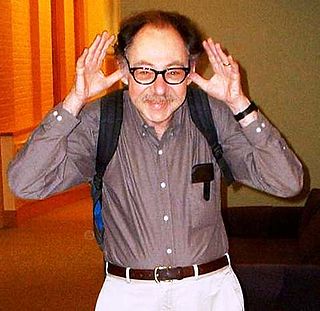A Quote by Jeff Vandermeer
When you think about the complexity of our natural world - plants using quantum mechanics for photosynthesis, for example - a smartphone begins to look like a pretty dumb object.
Related Quotes
We can look at the way of improving the key biochemical processes like photosynthesis itself. A lot of energy is lost to keep the plant cool. So maybe we can think of building plants which are more resistant to heat. Genetically modified plants can be one answer and we can imagine more efficient plants, call them 'energy plants'. And I believe, contrary to what ecologists think, they can still be beautiful plants.
In quantum mechanics there is A causing B. The equations do not stand outside that usual paradigm of physics. The real issue is that the kinds of things you predict in quantum mechanics are different from the kinds of things you predict using general relativity. Quantum mechanics, that big, new, spectacular remarkable idea is that you only predict probabilities, the likelihood of one outcome or another. That's the new idea.
I've been very involved in this quantum holographic formalism and helping to explore it as explanatory of the very root of our perceptual capabilities. It is postulated, for example, that this very basic entanglement, at the quantum level, at the level of subatomic matter, is really a part of quantum mechanics.
There were certain things that grabbed my interest, such as photosynthesis, such as us living off plants and plants living off us. You look at everything in that light - so if I'm looking at ice cubes, I might start thinking about absolute zero, or Fahrenheit and Celsius. There's so much that can make me think about science.
A. Douglas Stone, a physicist who has spent his life using quantum mechanics to explore striking new phenomena, has turned his considerable writing skills to thinking about Einstein and the quantum. What he finds and makes broadly understandable are the riches of Einstein's thinking not about relativity, not about his arguments with Bohr, but about Einstein's deep insights into the quantum world, insights that Stone shows speak to us now with all the vividness and depth they had a century ago. This is a fascinating book, lively, engaging, and strong in physical intuition.
As an adult I discovered that I was a pretty good autodidact, and can teach myself all kind of things. And developed a great interest in a number of different things from how to build a street hot rod from the ground up to quantum mechanics, and those two different kinds of mechanics, and it was really in the sciences, quantum mechanics, molecular biology, I would begin looking at these things looking for ideas, but in fact you don't read it for ideas you read it for curiosity and interest in the subject.
What are plants doing? What are plants all about? They serve human beings by being decorative, but what is it from its own point of view? It's using up air; it's using up energy. It's really not doing anything except being ornamental. And yet here's this whole vegetable world, cactus plants, trees, roses, tulips, and edible vegetables, like cabbages, celery, lettuce - they're all doing this dance.
No one intuitively understands quantum mechanics because all of our experience involves a world of classical phenomena where, for example, a baseball thrown from pitcher to catcher seems to take just one path, the one described by Newton's laws of motion. Yet at a microscopic level, the universe behaves quite differently.





































